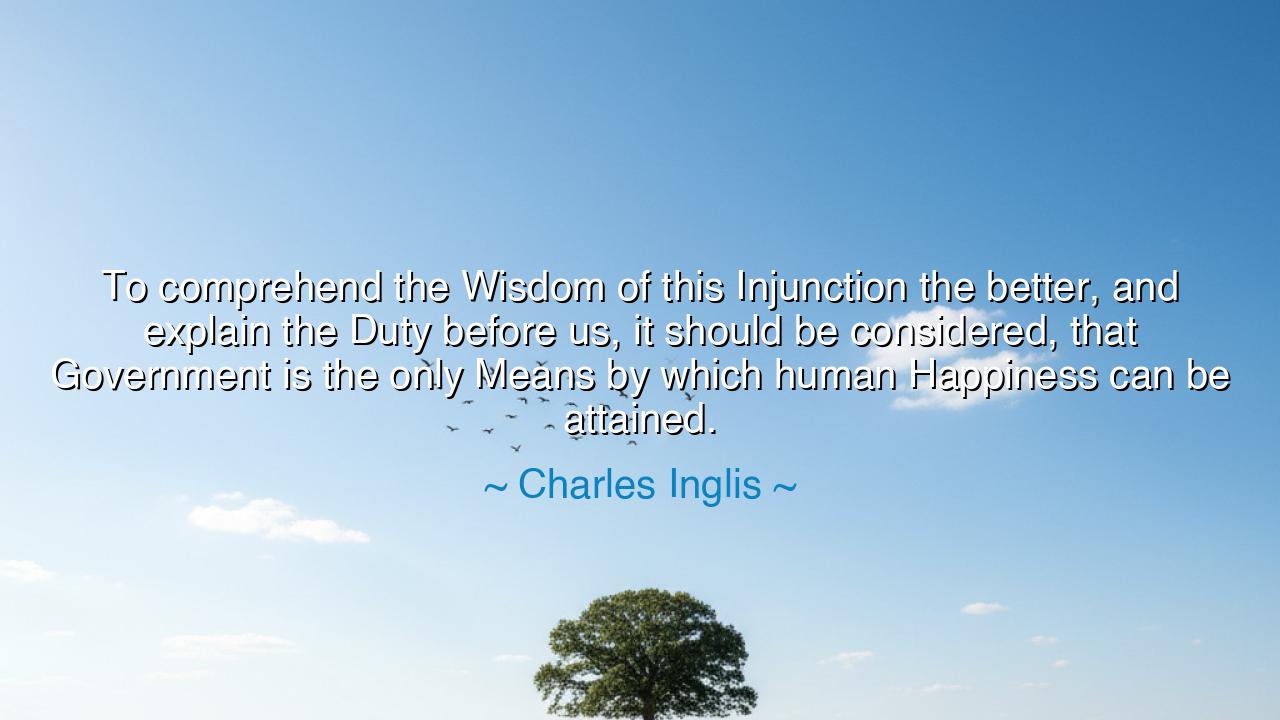
To comprehend the Wisdom of this Injunction the better, and
To comprehend the Wisdom of this Injunction the better, and explain the Duty before us, it should be considered, that Government is the only Means by which human Happiness can be attained.






Hearken, children of the ages, to the solemn words of Charles Inglis, who declared: “To comprehend the Wisdom of this Injunction the better, and explain the Duty before us, it should be considered, that Government is the only Means by which human Happiness can be attained.” In these words lies the eternal truth of order, duty, and the sacred purpose of governance. Inglis teaches that human happiness is not the fruit of chaos or unbridled freedom alone, but arises through the careful guidance, law, and structure that only a just government can provide.
Inglis instructs that wisdom in governance is inseparable from moral and civic duty. To understand the injunction he speaks of—the obligation to act rightly within society—is to recognize that each citizen is both beneficiary and participant in the structure of governance. Laws and institutions are not mere instruments of control, but conduits through which human well-being and societal harmony are realized. Duty to the state and respect for its order are therefore expressions of wisdom itself.
Consider the example of Solon of Athens, whose reforms balanced the rights of citizens with the stability of the polis. Solon recognized that justice, equality, and prudent lawmaking were essential to the happiness and flourishing of the people. By establishing a framework of governance, he ensured that the city could thrive, and the citizens could pursue virtue and prosperity. Here, Inglis’ reflection is mirrored: human happiness is rooted in the structures of order and enlightened authority.
The ancients themselves understood this principle deeply. Plato, Aristotle, and Cicero all taught that the life of man cannot flourish in anarchy or without reasoned rule. Society, law, and governance are the channels through which the moral, social, and intellectual capacities of humans find their expression. Inglis’ words echo this timeless truth: happiness is not mere indulgence, but the fruit of order, protection, and civic responsibility.
Thus, his counsel is both exhortation and guidance: recognize that the duty of citizens is intertwined with the maintenance of just government, and that wisdom is measured by the extent to which laws and institutions serve the happiness of the many. The structure of governance is the safeguard of virtue, peace, and prosperity, enabling human beings to pursue their potential within the bounds of reason and law.
Carry this teaching, children of generations yet unborn: honor the wisdom of governance, fulfill your duties within its bounds, and cherish the institutions that sustain human happiness. For it is through just authority, diligent civic engagement, and respect for law that the human spirit finds security, opportunity, and the enduring possibility of flourishing in accordance with virtue and reason.






VHVan Hong
I’m intrigued by how confidently this statement ties happiness to governance. It feels like a moral argument as much as a political one. Do you think Inglis saw government as a moral force, shaping citizens toward virtue, or as a practical mechanism to prevent misery? I’d like to explore whether he believed happiness depends more on good laws and order, or on the moral quality of the people those laws serve.
N8Quach Ai Nhi 8a4
This line makes me think about the tension between liberty and order. If government is the only way to achieve happiness, where does that leave those who see happiness in personal freedom or spiritual independence? Maybe Inglis was speaking from a time when chaos and instability made authority look like salvation. Still, I’d love to ask—can happiness born from obedience ever be as deep or lasting as happiness born from freedom?
ADANH DUC
From a reader’s point of view, this quote seems to elevate the role of government to a nearly divine status. But does that place too much trust in human institutions? Governments are made up of imperfect people, after all. I’m curious how Inglis would have reconciled the inevitable moral failings of leaders with the idea that government is the essential vehicle for happiness. Could he be suggesting that structure itself—rather than virtue—creates peace?
QOVu Quynh Oanh
I find this idea fascinating but also somewhat unsettling. If government is truly the only path to human happiness, does that mean an individual’s moral agency and self-determination are secondary? Isn’t there a danger in believing that happiness depends on an institution that can be flawed or corrupt? I’d like to hear a perspective on whether Inglis’s statement reflects an Enlightenment faith in rational governance or an early defense of authoritarian control.
CTCao Trang
This statement makes me reflect on how deeply intertwined government and human happiness might be. Do you think Inglis is arguing that people can’t achieve happiness outside the structure of government? It almost feels like he’s equating order with virtue. But what about individuals who find fulfillment in freedom from authority—does their happiness not count? I wonder if his view leans too heavily toward a paternalistic understanding of governance.